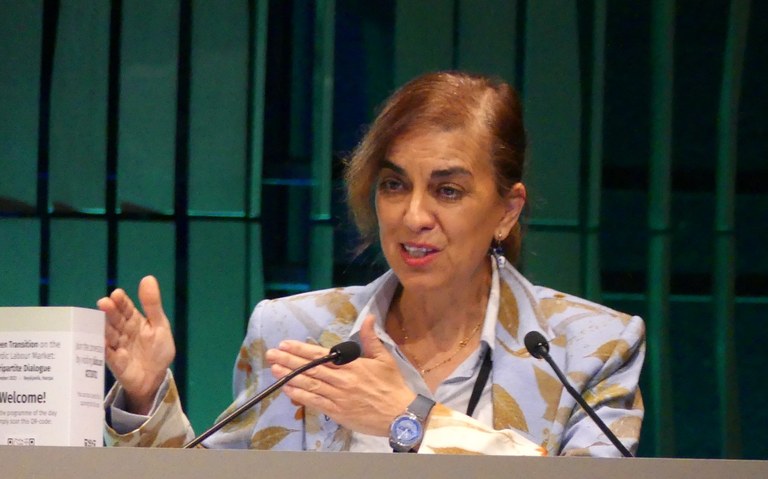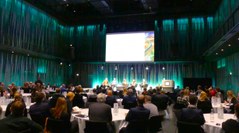Was the Reykjavik tripartite meeting the start of something new?
Did it turn into just another of the thousands of meetings around the world on the green transition? Or did something more happen as Nordic politicians, employers and trade unions met in Reykjavik on 1 December? The Icelandic Presidency had great ambitions for this meeting.
Did it turn into just another of the thousands of meetings around the world on the green transition? Or did something more happen as Nordic politicians, employers and trade unions met in Reykjavik on 1 December? The Iclenadinc Presidency had great ambitions for this meeting.
The prelude to the gathering took place in 2019 during the Council of Nordic Trade Unions (NFS) congress in Malmö. That is when the green transition really emerged as the key issue for Nordic trade unions. The motto was “There are no jobs on a dead planet”.
Iceland’s Prime Minister Katrín Jakobsdóttir was hosting and used her speech to emphasise that a green transition needs to be a just transition.
“As governments and trade unions, we have to make sure that what we do when it comes to the climate does not lead to less welfare for ordinary people. We cannot increase the price of petrol so much that only the rich continue to pollute while the poor cannot afford to get to work,” she said.
NFS is the collaborative body of the main trade union organisations in the Nordic region. There is a great range – from the Swedish Trade Union Confederation LO with its nearly 1.4 million members to Faroese Samtak with 6.000 members.
NFS is as old as the Nordic Council of Ministers, which is the governments’ collaborative body that was founded in 1972. But there is no corresponding Nordic organisation for employers.
That is why, two years after the 2019 Malmö meeting, there was spontaneous applause around the tables at Holmenkollen Hotel in Oslo during the NFS congress as Katrín Jakobsdóttir announced via video link from Iceland that she had invited the parties to a Nordic tripartite meeting on a just green transition towards the end of 2023.
The Nordic Council of Ministers’ vision for 2030 says the Nordic region should be the greenest region in the world. The path to a CO2-neutral society will require sacrifices and significant change.
However, the world has been through major changes before, like industrialisation and the ongoing digitalisation of both production and consumption.
It is still important to reduce emissions from the Nordics, but the climate will not be saved because of that alone. The most important thing the Nordic region can do is to show that a green transition can happen in a fair way with the necessary social safety nets in place when workers lose their jobs and have to retrain or get further education.
If the transition is unfair, we risk losing trust in our politicians and end up with populist movements like the yellow vests in France.
The Nordic social model will hopefully help with the rapid training of enough people with the skills needed for the transition – bridging over to the new society. Companies in the “brown” part of the economy cannot be expected to set aside money to train their employees to find work in competing green industries. The new green companies will also emerge in different places and need labour as well as municipal services in order to grow.
The Icelandic hosts were very clear that the Reykjavik meeting should result in a memorandum of understanding. Negotiations had been held in the run-up to the meeting, where every word was discussed thoroughly.
The memorandum of understanding says that in order to meet the Paris Climate Agreement, the ILO’s guidelines on just transition should be “the central reference for policymaking and a basis for action”.
The memorandum goes on:
- We highlight the importance of social dialogue in achieving an effective and successful transition on the Nordic labour market. We recognise the importance of social security, labour market-related rights, and a well-functioning labour market that respects equal treatment and equality as a vital part of the green transition.
- We recognise the need for new types of skills to match new types of jobs as industry is transformed into a low-carbon economy. Good opportunities for re- and upskilling of workers and job seekers will therefore be essential.
- We highlight the importance of good conditions for vocational and geographical mobility for smooth green transition in all regions. We acknowledge the importance of thriving educational systems and broad cooperation to ensure the right match between supply and demand for certain skills and to be well prepared for future developments and impact on the Nordic labour market.
The memorandum of understanding ends with a clear call to promote the tripartite cooperation model and to share experiences with others. It is only when the Nordic progress can be replicated in other countries that you can create the desired effect on the climate.

Cristina Martinez, Senior Enterprise development and Green Job Specialist, ILO. Photo: Björn Lindahl.
The negative consequences of climate change can already be seen. Globally some 80 million jobs could disappear just because of the extreme drought that is affecting parts of the world, warned the ILO’s Cristina Martinez.
She considers the Nordics to be a source of inspiration but admits that it might be difficult to replicate Nordic solutions in countries whose democratic processes and social dialogue are not as developed.
“But the Nordic countries can absolutely be an inspiration to the rest of the world. The Nordic tripartite model is a good example of this,” she says.
- How best to cooperate?
-
How can governments and trade unions cooperate on issues that are central to employees? That is what Sweden's Minister for Employment Johan Pehrson, Iceland's Minister of Social Affairs and the Labour Market Guðmundur Ingi Guðbrandsson and the Norwegian YS President Hans-Erik Skjæggerud tried to answer during one of the panel debates (where Kolbrún Halldórsdottir, President of The Icelandic Confederation of University Graduates BHM, also participated).
- Read the whole Memorandum of Understanding
-

 Follow us on Facebook
Follow us on Facebook
